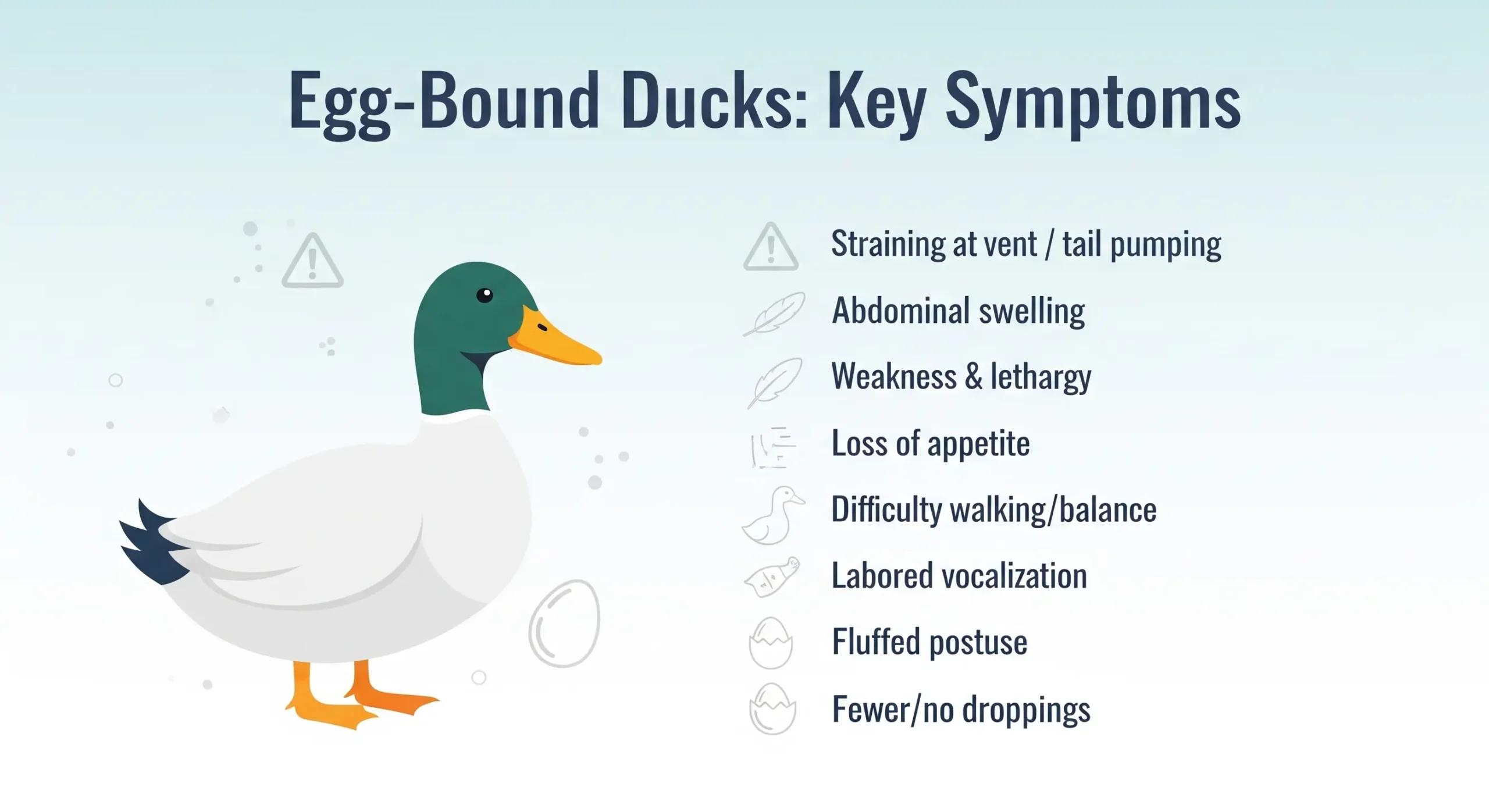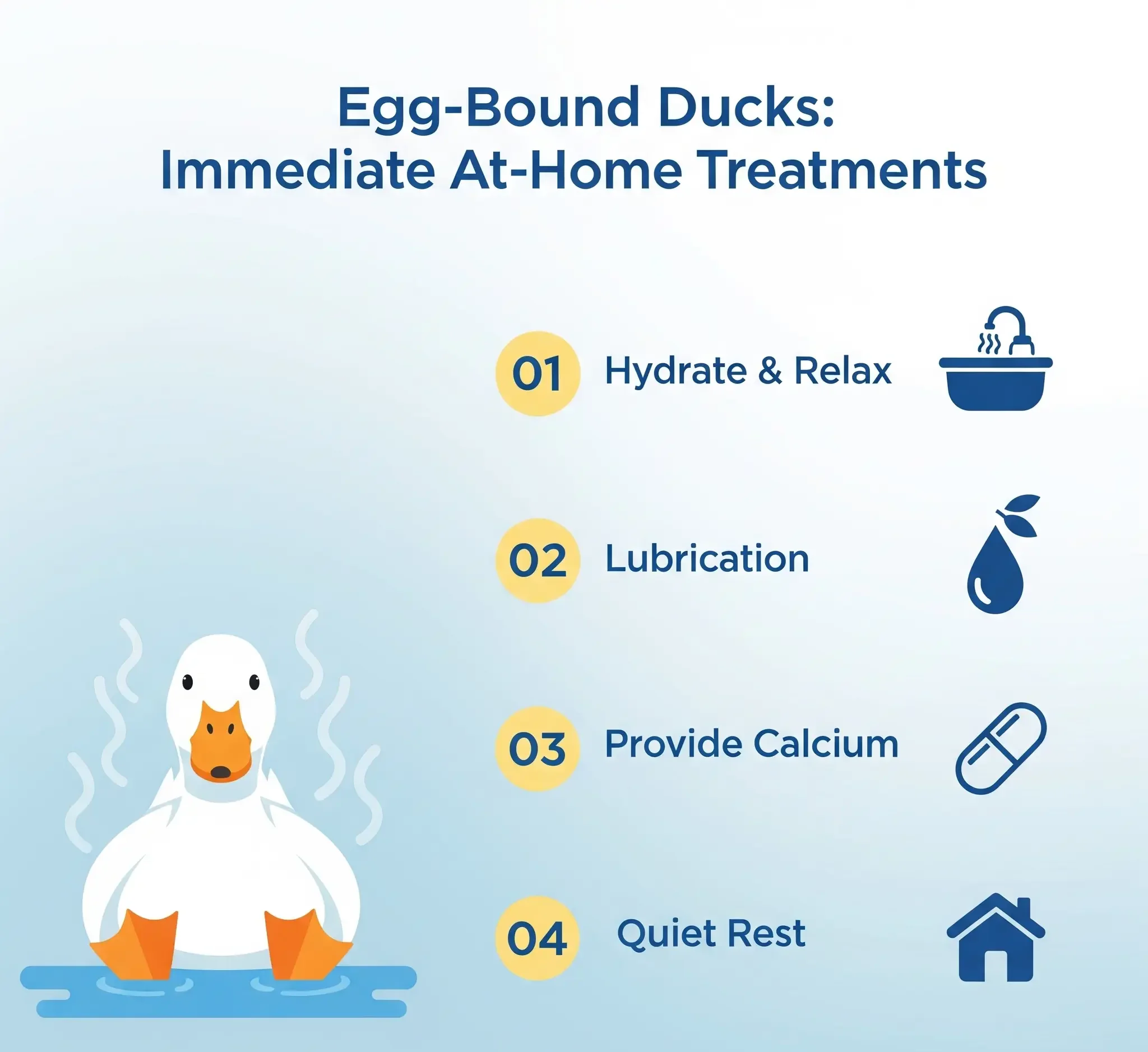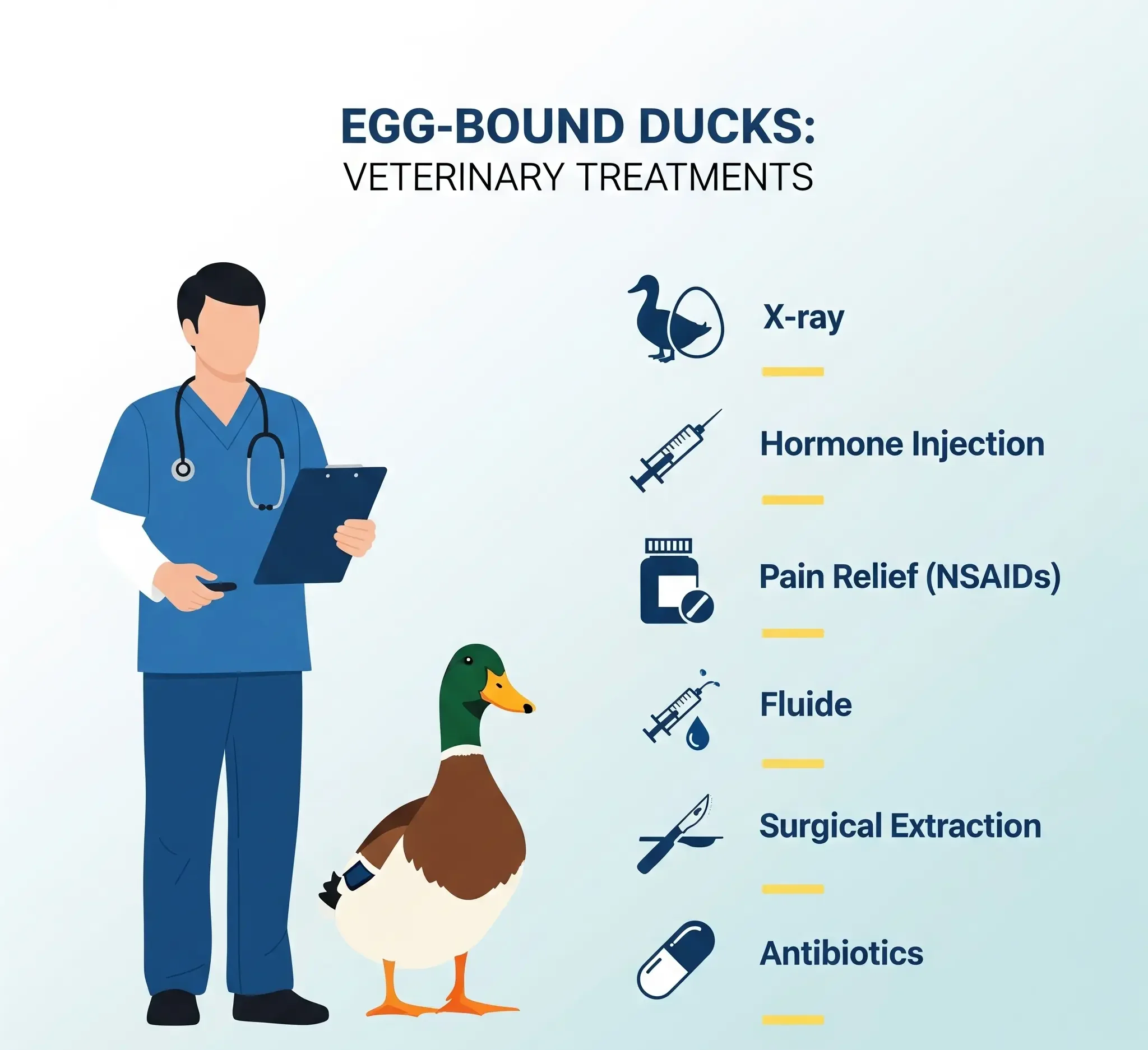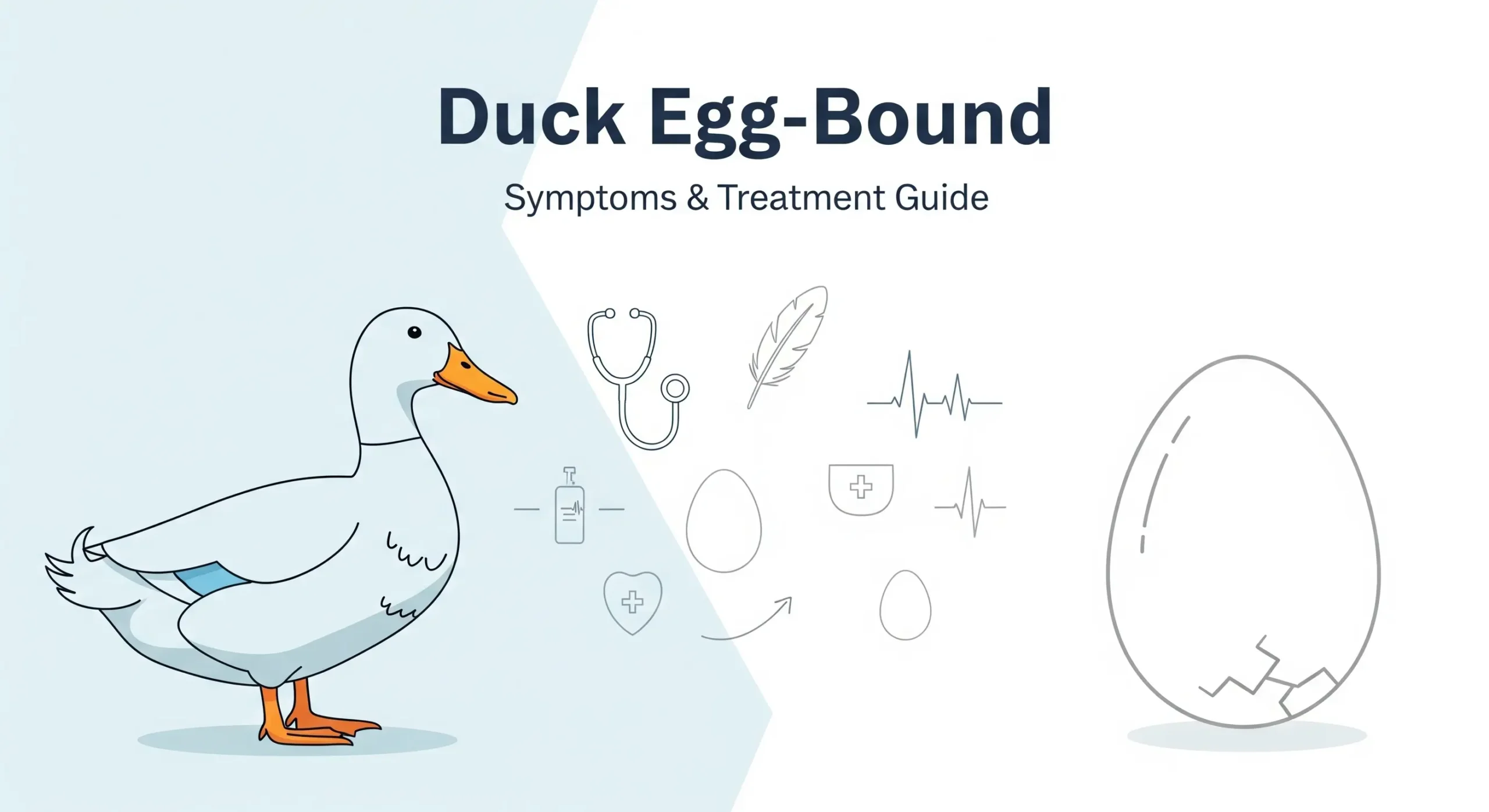If you’ve ever walked out to your coop and seen a duck hunched up, straining, or looking off, you know the panic.
The word “egg-bound” hits harder than most poultry problems because it’s both common and life-threatening.
I’ve been there—the lethargic duck, the swelling in the belly, the refusal to eat.
It feels helpless until you know what steps to take.
This isn’t just “oh, she’s constipated.” Egg-binding is a serious reproductive tract obstruction that can kill a duck in under 48 hours if untreated.
Let’s break it down step by step: the real signs, the exact home care you can try, and when it’s time to stop and call a vet.
What Does “Egg-Bound” Mean in Ducks?
Being egg-bound simply means a duck has an egg stuck in her oviduct and can’t lay it naturally.
Sometimes it’s one egg. Other times, fragments of shell, membranes, or even multiple soft-shelled eggs create a blockage inside the reproductive tract.
Why it matters:
- Ducks can’t urinate separately. Waste builds up behind the blockage.
- That leads to toxin accumulation, swelling, and infection.
- If the egg ruptures inside, peritonitis (infection in the abdominal cavity) sets in fast.
Think of it like a traffic jam in the worst possible spot.
How to Identify Egg-Bound Ducks | Key Symptoms
I always remind keepers: you can’t fix what you don’t recognize. Here’s the red-flag checklist.

The Big Signs to Watch:
- Straining at the vent, tail pumping
- Visible swelling or abdominal distension
- Lethargy, weakness, not moving much
- Loss of appetite or refusal of snacks
- Difficulty standing, waddling, or keeping balance
- Quacking/vocalization that sounds like distress
- Labored respiration or breathing issues
- Fluffed-up feathers, hunched posture
- Fewer droppings, diarrhea, or nothing coming out
If multiple symptoms show up at once, assume the worst and act immediately.
Why Ducks Become Egg-Bound | Root Causes
Most cases I’ve seen trace back to one or more of these:
- Calcium deficiency: weak shells, poor contractions in the uterus.
- Obesity / overweight birds: too much fat interferes with muscle function.
- Nutrition imbalance: too many scraps, not enough fortified poultry feed.
- Young or first-time layers: their reproductive system is still adjusting.
- Stressors: predators, poor nesting areas, overcrowding, or illness.
- Genetic or anatomical abnormalities: curved oviducts, cysts, or tumors.
Bottom line: Ducks don’t get egg-bound “for no reason.” There’s almost always a trigger.
Immediate At-Home Treatments for Egg-Bound Ducks
If you catch it early, you may save her without surgery. Here’s what’s worked for me and what vets recommend:

Step 1: Hydrate & Relax the Muscles
- Give a warm water bath (with Epsom salt) for 15–20 minutes.
- The warmth relaxes the muscles of the oviduct.
- Hold her gently; let her float if she can.
Step 2: Lubrication
- Use clean olive oil or water-based jelly around the vent.
- Don’t forcefully push—it can rupture the egg.
Step 3: Provide Calcium
- Offer calcium glubionate or Tums (plain, no flavors).
- Calcium fuels uterine contractions to help expel the egg.
Step 4: Quiet, Low-Stress Environment
- Move her to a playpen with pine shavings, away from the flock.
- Stress reduction matters—noise or predators delay laying.
Veterinary Treatments for Severe Cases
If 12–24 hours pass and nothing improves, it’s time for the professionals. I’ve learned this the hard way—waiting too long can be fatal.
A certified avian veterinarian may use:

- X-ray to identify blockage and egg positioning.
- Oxytocin hormone injections to stimulate oviposition.
- NSAID pain management like Meloxicam for relief.
- Syringe feeding fluids if dehydration sets in.
- Surgical extraction if rupture, fragments, or infection occur.
- Antibiotics if peritonitis or tissue damage is detected.
Yes, it’s expensive. Yes, it’s worth it—losing a duck to something treatable hurts far more.
The Risks of Doing Nothing
Here’s what not acting on an egg-bound duck leads to:
- Ruptured egg, leading to infection and toxins inside the body
- Respiratory issues from abdominal pressure
- Internal tissue damage
- Mortality within days if untreated
This isn’t one of those “let’s wait and see” conditions.
Preventing Egg Binding in Ducks | The Long Game
Prevention always beats the emergency invoice. Here’s the proactive plan:
- Balanced diet: Use layer feed fortified with calcium + vitamin D.
- Supplements: Crushed oyster shells, Calcivet, or calcium-glubionate.
- Protein variety: Insects, soldier-fly larvae, snails, minnows.
- Clean water for hydration: Always full, fresh, and unfrozen.
- Avoid obesity: Limit table scraps, watch weight.
- Good housing: Safe nesting areas, predator-free zones, dry bedding.
- Regular veterinarian checkups: Especially for flocks with laying problems.
These steps reduce egg-binding risks dramatically.
My Personal Experience With an Egg-Bound Duck
One of my hens, Daisy, looked bloated, stopped eating, and waddled like she’d lost balance. The warm bath trick + calcium supplement saved her within hours.
But another duck, same flock, wasn’t so lucky—she needed hospitalization, X-rays, and oxytocin injections. It cost me, but she survived.
That was my wake-up call: prevention through nutrition and environment isn’t optional—it’s the commitment we owe our flocks.
Conclusion: Stay Alert, Act Fast, Save Your Duck
Being egg-bound isn’t just uncomfortable—it’s life-threatening.
With fast action—hydration, warmth, calcium, and vet care—most ducks recover fully.
Ignore it, and you risk rupture, infection, or death.
Prevention, good diet, and regular health checks mean fewer emergencies and a healthier flock.
The best keepers aren’t the ones who never face problems—they’re the ones who spot symptoms, take action, and protect their ducks’ well-being.
FAQs: Egg-Bound Ducks
How can I tell if my duck is egg-bound or just tired?
If she’s straining, swollen, and off her food—assume egg-bound until proven otherwise. Ducks don’t fake symptoms.
Can I help a duck pass an egg at home?
Yes, warm baths, calcium, and gentle vent lubrication are safe first steps. But don’t force it—vet care is crucial if nothing works fast.
Is egg-binding common in ducks?
Yes. Especially in young layers, overweight ducks, or when calcium intake is low.
Can egg-binding kill a duck?
Absolutely. It leads to rupture, peritonitis, and death if untreated. This is a true emergency condition.
How do I prevent my ducks from becoming egg-bound?
Balanced feed, oyster shells or calcium supplements, clean water, and safe housing cut most of the risk.
Sources and Further Reading:
- https://www.merckvetmanual.com/poultry/disorders-of-the-reproductive-system/egg-binding-in-poultry
- https://www.vetmed.ucdavis.edu/hospital/small-animal/companion-exotics/services/resources/basic-care-ducks
- https://lafeber.com/pet-birds/egg-binding/
- https://extension.psu.edu/calcium-in-the-laying-hen
- https://www.msdvetmanual.com/exotic-and-laboratory-animals/pet-birds/reproductive-diseases-of-pet-birds


